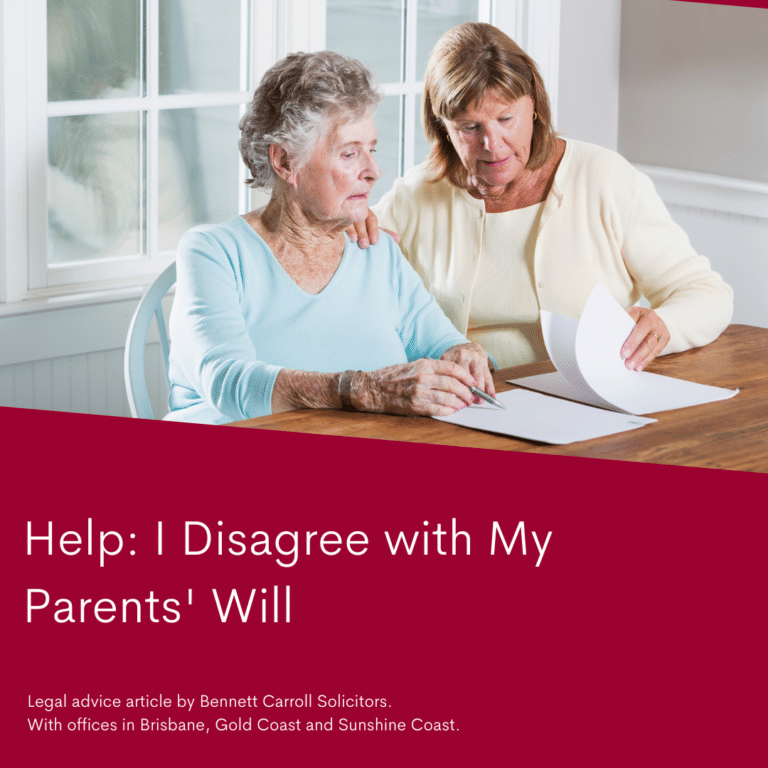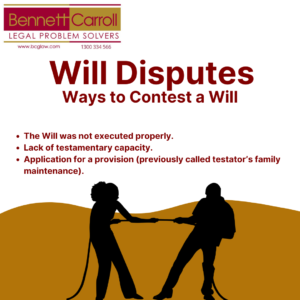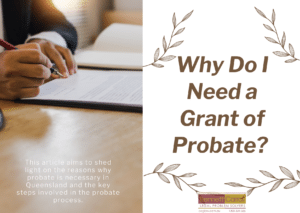Discovering that you disagree with the provisions of your parents’ will can be an emotionally challenging experience. Whether you feel that the will does not reflect their true intentions, suspect undue influence, or believe the distribution is unfair, it is important to handle the situation with care and consideration. Here is a guide to navigating this difficult terrain.
Understanding Your Concerns
First, identify why you disagree with the will:
Fairness: Do you feel that the distribution of assets is inequitable?
Intentions: Do you believe the will does not reflect your parents’ true wishes?
Undue Influence: Are there concerns that someone unduly influenced your parents when making the will?
Legal Validity: Do you suspect that the will might not meet legal requirements?
Steps to Take
- Seek Legal Advice
Consulting with a solicitor who specializes in wills and estates is crucial. They can help you understand the legal standing of the will and your rights. In Queensland, specific laws and processes govern contesting a will, and a legal expert can guide you through them.
- Review the Will’s Validity
Ensure that the will is legally valid:
Testamentary Capacity: Were your parents of sound mind when they made the will?
Proper Execution: Was the will signed and witnessed correctly?
Freedom from Undue Influence: Was the will made without coercion?
A solicitor can help you evaluate these aspects and determine if there are grounds to challenge the will.
- Gather Evidence
If you suspect the will is not valid or reflects undue influence, gather evidence:
Medical Records: These can provide insight into your parents’ mental state when the will was made.
Witness Statements: Testimonies from those who witnessed the signing or were close to your parents can be valuable.
Documentation: Any letters, emails, or notes that indicate your parents’ intentions.
- Family Discussion
Before taking legal action, consider discussing your concerns with other family members. A mediated family meeting can sometimes resolve misunderstandings and avoid the emotional and financial costs of legal disputes.
- Mediation
Mediation is a less adversarial process than going to court. A neutral third party can help you and your family members communicate and find a mutually acceptable solution.
Contesting the Will
If you decide to contest the will, there are specific legal grounds you can cite:
Lack of Testamentary Capacity: If your parents were not of sound mind when they made the will.
Undue Influence: If someone pressured your parents into making the will.
Fraud or Forgery: If the will was tampered with or is a forgery.
Failure to Meet Legal Requirements: If the will was not properly executed.
In Queensland, the process typically involves:
Filing a Caveat: This prevents the will from being probated until the dispute is resolved.
Lodging a Family Provision Application: If you believe you have not been adequately provided for, you can apply for a greater share of the estate.
Understanding the Consequences
Contesting a will can be a lengthy, expensive, and emotionally draining process. It can also strain family relationships. Before proceeding, weigh the potential benefits against the emotional and financial costs.
Alternatives to Contesting
If contesting the will seems too daunting or if legal grounds are weak, consider these alternatives:
Negotiation: Sometimes, a simple negotiation with the executor or other beneficiaries can lead to an agreeable solution.
Out-of-Court Settlement: An out-of-court settlement can save time, money, and emotional energy.
Disagreeing with your parents’ will is a delicate situation that requires careful consideration and, often, legal guidance. By understanding your concerns, seeking legal advice, and exploring all available options, you can navigate this difficult time with a clearer perspective and a better chance of achieving a resolution that respects your parents’ intentions and addresses your concerns. Remember, the goal is to honour your parents’ wishes while ensuring fair and lawful distribution of their estate.
If you require legal advice or representation in any legal matter, please contact Bennett Carroll Solicitors. We have offices in Brisbane, Gold Coast and Sunshine Coast.







